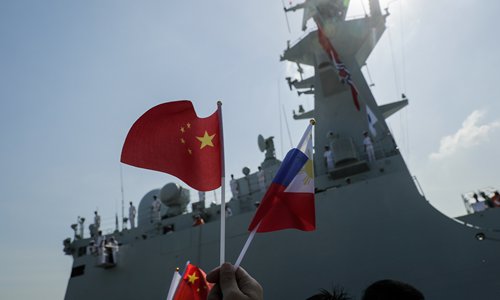HOME >> OPINION
China-Philippines ties a model for cooperation
By Li Qingqing Source:Global Times Published: 2019/7/23 21:23:40

Photo: IC
At Monday's State of the Nation Address, Philippine President Rodrigo Duterte defended his agreement with Chinese President Xi Jinping to allow Chinese fishermen to operate in the South China Sea, or "the West Philippine Sea," as it is known in the Philippines. He also said that the agreement would ensure there would be no war in the South China Sea.
"War leads widows and orphans in its way. I am not ready or inclined to accept the occurrence of more destruction, more widows, and more orphans, should war even on a limited scale break out," Duterte said.
Why did Duterte persist in acting in a peaceful, cooperative and restrained way in the South China Sea despite some domestic criticism and US instigation? Because Duterte has realized that putting disputes aside and seeking cooperation with China brings most benefits to his country. Through cooperative development, China and the Philippines are making an effort to ease tensions in the region and explore a new path of regional cooperation.
Some countries concerned, even countries outside the region, are very sensitive about China's movements in the South China Sea. These countries over-interpret China's decisions, accuse China of "bullying," and even sow dissension among countries in the region to benefit from it. But if these countries really hope for peace and stability in the South China Sea, they should focus on joint development rather than hyping the South China Sea issue and badmouthing China.
Take the joint development between China and the Philippines. The two countries released a joint statement in 2018, in which they said, "Both sides agree to exercise self-restraint in the conduct of activities in the South China Sea that would complicate or escalate disputes and affect peace and stability." The two leaders also signed 29 agreements and MOUs, including an MOU on oil and gas development cooperation.
For the Philippines, a country that used to rely heavily on oil imports, such a joint development with China in the South China Sea not only eases Manila's pressure of imports, but also reduces its over-reliance on the international energy market. Such cooperation also improves the Philippines' energy structure and will greatly benefit the country in the long run. Instead of struggling with disputes, doesn't such win-win cooperation bring greater advantage to both sides?
China continues to restrain itself on the South China Sea issue. Otherwise, China could have already used coercive measures to take back all the islands illegally occupied by other countries. But this does not mean China is a pushover. China is determined to safeguard its national sovereignty, and also has the goodwill to maintain peace and promote cooperation in the South China Sea. China is also willing to promote negotiations on the Code of Conduct (COC) in the South China Sea to ensure regional stability. There will be twists and turns during cooperation in the South China Sea. But the direction to manage dispute and promote cooperation is right. Countries concerned can benefit only if they work together toward cooperative development.
Posted in: OBSERVER